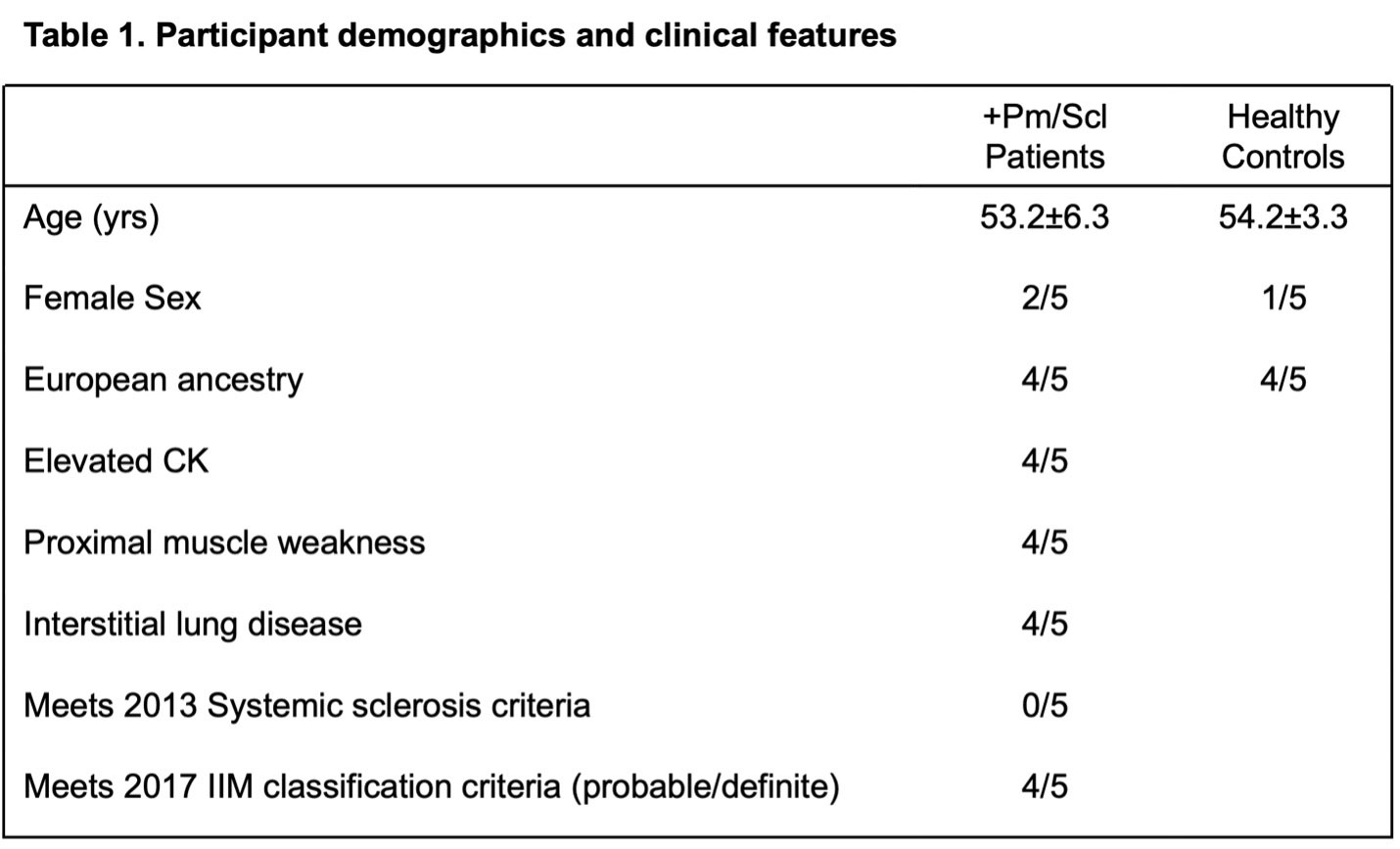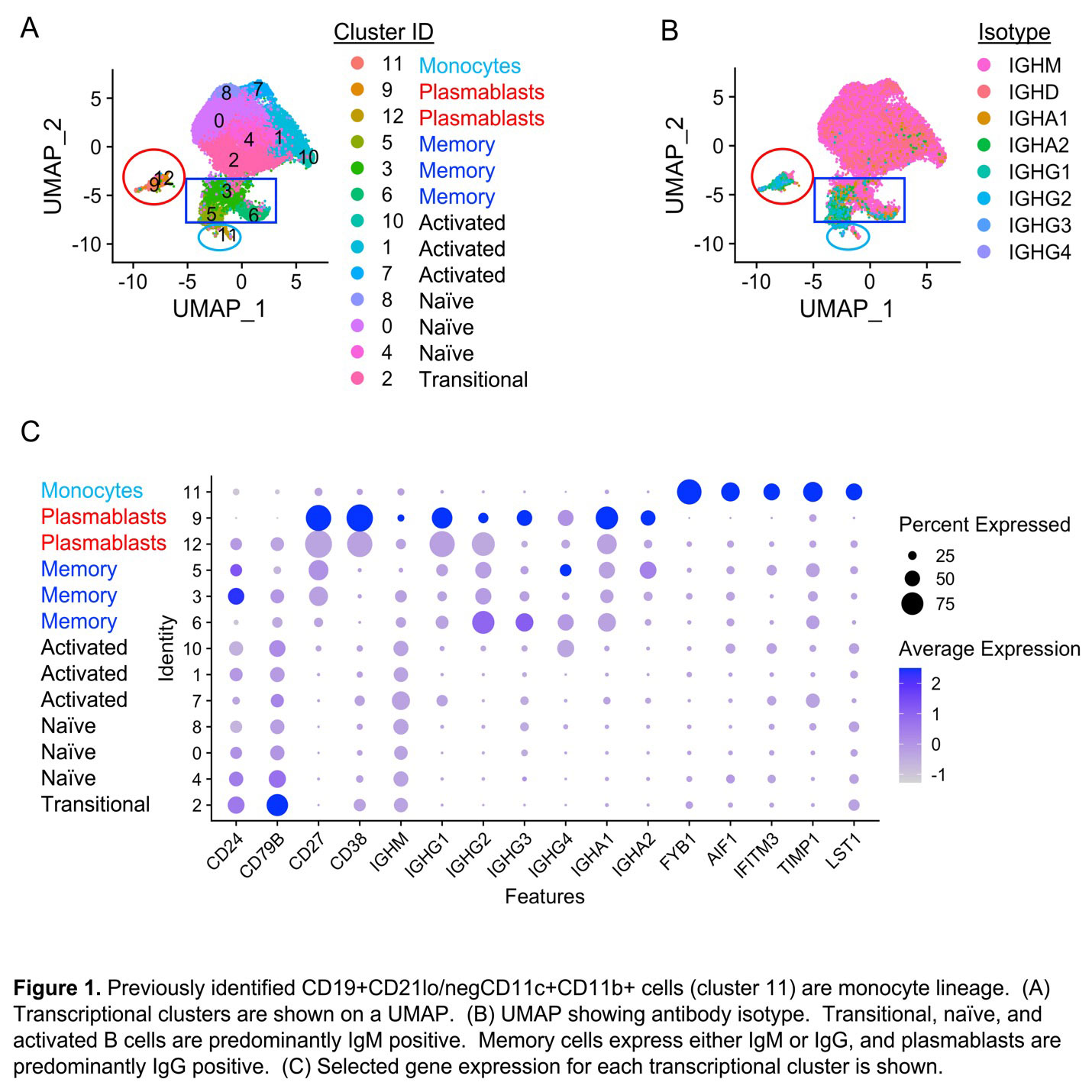Session Information
Session Type: Poster Session A
Session Time: 1:00PM-3:00PM
Background/Purpose: CD19 is considered a canonical B cell lineage marker. Previously, we have reported that CD19+CD21lo/negCD11c+ cells were increased in both systemic sclerosis [PMC8828801] as well as one immune endotype of inflammatory myositis expressing the Pm/Scl+ autoantibody [PMC8964392]. These cells did not express traditional B cell surface markers such as IgD, IgM, CCR4, or CCR6 but expressed the monocyte markers CX3CR1, CD11b, and CD11c. Single cell RNA-seq was performed to determine whether this CD19+ cell population was of B cell lineage.
Methods: Peripheral blood mononuclear cells were collected via venipuncture, isolated using CPT tubes, and cryopreserved (VUMC IRB 141415). Five +Pm/Scl patients and five healthy control samples were stained with the Total-Seq C human cocktail, and live CD19+CD3- cells were isolated via fluorescence activated cell sorting. Cells underwent RNA-seq (transcriptomic), CITE-seq (phenotypic), and BCR-seq (immune repertoire) profiled using the single cell, 10X genomics platform. Resulting data were processed using CellRanger and analyzed using a custom Seurat-based pipeline.
Results: Table 1 shows participant demographics and clinical features. The final analysis included 10,175 healthy and 13,864 +Pm/Scl live CD19+ cells. Figure 1 shows a UMAP with Seurat-identified clusters based on transcriptional similarity. Cluster 11 (light blue circle) corresponds to our previously identified CD19+CD21lo/negCD11c+ population. Notably, this population did not express immunoglobulin genes but expressed several monocyte genes including LST1, AIF1 (upregulated in rheumatoid arthritis monocytes), and TIMP1 (upregulated in systemic sclerosis monocytes). Based on these results, the CD19+CD21lo/negCD11c+ was identified as monocyte– not B cell – lineage.
Conclusion: The CD19+CD21loCD11c+ population identified in Pm/Scl+ IIM patients represents a monocyte population. This finding underscores the importance of combining transcriptional and surface marker analysis in immune profiling. Furthermore, this expanded population may contribute to clinical features shared between SSc and Pm/Scl+ IIM.
To cite this abstract in AMA style:
Wilfong E, Crofford L, Bonami R. Pm/Scl Patients Have an Expanded Population of CD19+CD21lo/negCD11c+CD11b+ Cells Expressing a Monocyte, Not B Cell, Transcriptome [abstract]. Arthritis Rheumatol. 2022; 74 (suppl 9). https://acrabstracts.org/abstract/pm-scl-patients-have-an-expanded-population-of-cd19cd21lo-negcd11ccd11b-cells-expressing-a-monocyte-not-b-cell-transcriptome/. Accessed .« Back to ACR Convergence 2022
ACR Meeting Abstracts - https://acrabstracts.org/abstract/pm-scl-patients-have-an-expanded-population-of-cd19cd21lo-negcd11ccd11b-cells-expressing-a-monocyte-not-b-cell-transcriptome/


